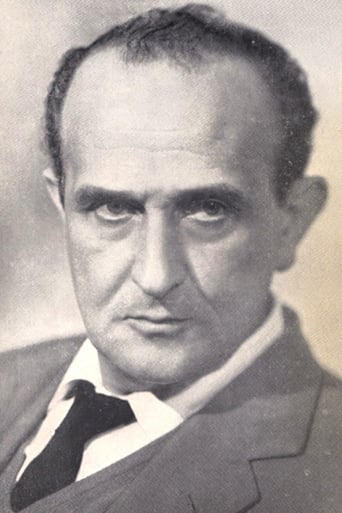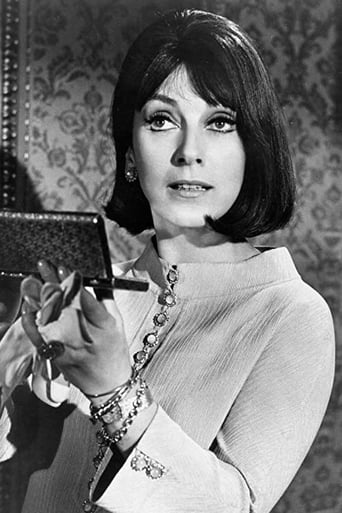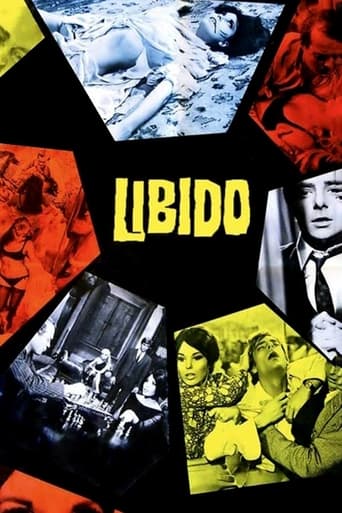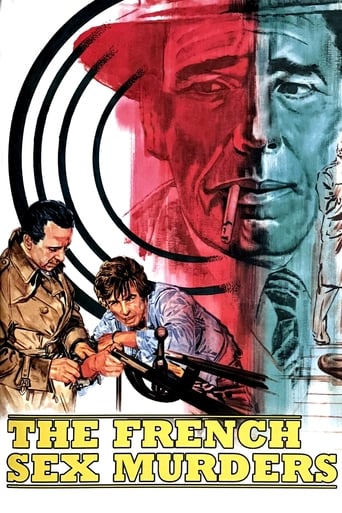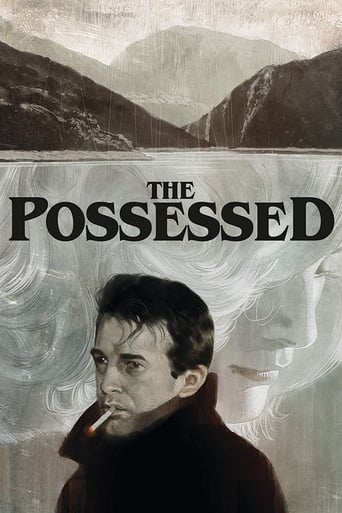
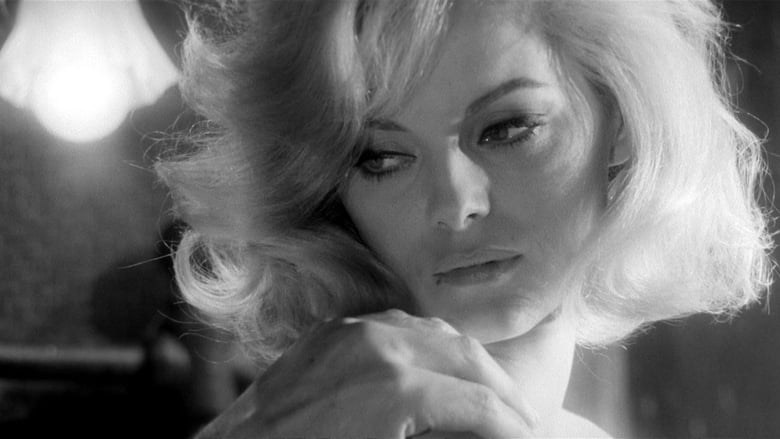
The Possessed (1965)
While visiting his favorite resort village during winter, a writer investigates the apparent suicide of a woman he was infatuated with.
Watch Trailer
Cast


Similar titles
Reviews
'Lady of The Lake' (aka) 'The Possessed is an enigmatic, almost impenetrable quasi-giallo by the excellent, Luigi Bazzoni, the talented, intellectual auteur behind the equally idiosyncratic, almost anti-gialli 'Footsteps On The Moon'(1975). Since ''La Donna Del Lago' was also written by fellow iconoclast, Gulio 'Death Laid an Egg' Questi, one might expect a similarly oblique tone, and in terms of confounding genre conventions, he doesn't disappoint. While some might consider 'Lady of The Lake' to be just another example of overwrought nouvelle vague-esque cinematic doodling; but to dismiss this elegiac work as mere self- indulgence is to miss out of one of Italy's most singular and glacial thrillers.
A young writer Bernardo (Peter Baldwin) decides to come back to a small town, set nearby a lake, where he had previously stayed and met a attractive maid and waitress – Tilde (Virna Lisi). The place is desolate then, as the action takes place in winter and the tourist are not particularly interested in this place at this part of the year. Bernardo is in search for peace and quiet and this is why he has an intention of having a rest there and working on his new book. However, after some time it dawns on him that, actually subconsciously, he wants to meet the beautiful waitress. He plans to rediscover her and starts searching, after which he is informed by the owner of the hotel about her mysterious death This is often considered to be one of the earliest examples of giallo genre, along with Blood And Black Lace (1964). In spite of this fact, this cannot be considered, just like later effort by Bazzoni, masterful Footprints On The Moon (1975), to be a typical mystery that made a pattern for all films of this genre, as it differs drastically. In addition to this, the flick is more likely to remind Blow Up (1966) by Antonioni than The Bird With Cristal Plumage (1969) or Deep Red (1975) by Argento. The main character appears to be lost in the world of his own illusions and enquires himself what is real and what is just his imagination, just like David Hemmings in Antonioni's masterpiece. While Michelangelo Antonioni is more interested in general subject of perception and human identity in the world, in which being a witness is a very relative phenomenon, Bazzoni avoids such topics and focuses on delving into Bernardo's mind. Our protagonist himself is not a witness, he's just implicated in a twisted affair surrounding this town. To render psychological aspect even more visible and more articulate, the director utilizes a very slow pace and we can hear our character's thoughts. Owing to this, the viewer is able to follow all the vacillations of the main character and follow all possible ways of Tinde's demise accompanying this mystery envisioned by Bernardo. What is more, Bazzoni exploits black-and-white cinematography which makes things even more fascinating. To sum up, all these elements give it a very distinctive look and it is far from a simplistic murder mystery and the film becomes a sort of a psychological drama. At the end, nothing seems to be concluded and unraveled in detail. In spite of the fact that Bernardo's explanation is the most probable, there are plenty of additional subplots which suggest that many things remain obscure and inexplicable. Thanks to an exceptional editing, chilling sequences of dreams and flashbacks merged together, the ensemble looks terrific.Therefore, nothing is certain in this flick. The whole plot is shown from the Bernardo's point of view, along with his visions and dreams. This render everything not only a murder mystery, but also a great psychoanalysis of the Bernardo's mentality, exposing all his fears, desires and his vague relationship with Tilde whose personality we get to know through his memory. Thus, this subjective nature and unusual perspective make it so extraordinary and riveting. The script itself isn't the biggest advantage of this picture. If it was made by somebody else, it would possibly be a flop. Fortunately, on account of tremendous direction by Bazzoni, his visual style, exquisite taste for creating adequate atmosphere of anticipation and ambiguity, The Possessed (1965) (La donna del lago) is a true gem.The cast is nothing special, but all of the actors manage to achieve a satisfying level of acting artistry. Peter Baldwin, a little known television actor, gives a quite decent performance. There are a couple of familiar faces: such as Phillipe Leroy, known for his roles in Yankee (1966) by Tinto Brass, and Salvo Randone from Investigation of a Citizen Above Suspicion (1970) by Elio Petri. Their roles are rather a minor ones, as Peter Baldwin is the most important character and the action revolves around him.Overall, La donna del lago (1965) might not be as visually striking as gorgeous Footprints On The Moon (1975), nonetheless it's a very impressive little movie that should be more known than actually it is. The story itself is nothing really new, but the way it is executed makes this one refreshing and worth a look. Luigi Bazzoni attaches a great importance to a psychological aspect of characters in the film and owing to this outshines many other flicks in its genre. Now, it remains only a hidden gem and sadly it seems there is no possibility to popularize it in the nearest future. Pity. This deserves to be more prevalent.
Recently, I had been impressed with Bazzoni's weird offering FOOTPRINTS (1975); so, when I happened upon this even more obscure (and, by all accounts, rarer) earlier title from him, I decided to check it out and, boy, is it a find for Euro-Cult/Art-house buffs! The film, in fact, can perhaps best be described as an arty semi-giallo; interestingly, it contains several echoes to Bazzoni's later effort: the resort town, the central hotel setting, the strange characters encountered by the hero (in FOOTPRINTS, the bewildered protagonist was a woman), the mystery revolving around a missing person not to mention the deliberate (and deliberately-paced) oblique narrative.What is immediately arresting here (in spite of the somewhat fuzzy quality of the print on display) is the supreme style allotted to the film's look which is wintry, bleak and forbidding by its two directors (incidentally, this was Rossellini's only stint in such capacity!); to this end, they wisely recruited veterans such as cinematographer Leonida Barboni (but who also adopts peculiar framing throughout, none more so that the pan in extreme close-up of a character's face with the gleaming lake for backdrop!) and production designer Luigi Scaccianoce. However, equally important to the fabric of the piece are the contributions of Renzo Rossellini (supplying an appropriately moody score) and editor Nino Baragli (whose frequent jump-cuts and seamless juxtaposition between reality, recollection and outright fantasy create a genuine and admirably disorientating effect on the viewer). Incidentally, THE POSSESSED a misleading English title but a literal translation of the original, THE LADY OF THE LAKE, would be no less ambiguous! was co-written (with Bazzoni and Franco Rossellini) by Giulio Questi; for the record, as a director in his own right, the latter went on to make such idiosyncratic yet haunting revisions of genre convention as the Spaghetti Western DJANGO, KILL IF YOU LIVE, SHOOT! (1967) and the giallo DEATH LAID AN EGG (1968).The cast is compact but exceptionally noteworthy: Peter Baldwin (very good in Dino Risi's LOVE IN ROME [1960] here, in what I assume to be his most significant role, he's downright excellent!), Salvo Randone (as the owner of the hotel whom the hero suspects of both lechery and murder, he manages to alternate between a genial and sinister countenance throughout), Valentina Cortese (a typically fine performance, though her weather-beaten looks make it hard to convince us she's Randone's daughter even if a reasonable age gap separates the two actors!), Philippe Leroy (having appeared in so many films from the 1960s and 1970s that I've watched in recent years and, thanks also to his remarkable versatility, the French actor has become a firm favorite of mine!), Virna Lisi (while undeniably sensual, her contribution basically amounts to an extended cameo since her character, who seems to have turned the heads of virtually the entire male cast at some point, is already dead when the film opens and we only see the girl in flashback/fantasy sequences!) and Pia Lindstrom (a rare cinematic appearance by Ingrid Bergman's elder daughter being similarly steeped in mystery, alas, she too is barely given time to create a flesh-and-blood character but, then, her resultant fragile performance emerges to be all the more moving for it!).The plot concerns an author (Baldwin) arriving off-season at a resort town he habitually retired to in order to work, hoping to meet again a servant-girl (Lisi) he's enamored of employed at the hotel run by Randone; however, he's told she's no longer there but notices that her cloak is still hanging in the closet, follows a woman in the streets he sees wearing it (and is eventually disappointed to learn the outfit now belongs to Lisi's replacement). Typically, he decides to delve deeper into the mysterious circumstances surrounding the former maid's demise still, Randone and his family (Cortese assists in the managing of the establishment while brother Leroy owns a butcher shop situated in the courtyard of the hotel itself and, coincidentally, has just returned from his honeymoon with wealthy but naïve and sickly bride Lindstrom) generally evade his probing. Even the only man who's willing to help at first a hunchbacked local photographer (I'm not sure about the actor's name but his face is awfully familiar!), who presents Baldwin with a photo in which Lisi is visibly pregnant suddenly opts out and leaves town in a hurry!; then, there's Lisi's alcoholic bum of a father who seems to have nothing of value for the hero to work on venting the anger and frustration over his daughter's loss by bursting into vitriolic (but ineffectual) nightly rants outside the hotel windows! At one point, Lindstrom makes a weak attempt to communicate with Baldwin but, before they can meet (he had previously noticed the girl walking aimlessly by the lake at night a number of times, but never quite mustered the nerve to confront her), she too is found dead! Eventually, the hero starts to think he may have gotten it all wrong: perhaps Lisi wasn't so much a victim of circumstance (periodically abused by both father and son!) as a femme fatale who got killed simply because she was too greedy.The final revelation then, takes things in another direction altogether; while certainly effectively handled, the scene does perhaps constitute a slight let-down as it won't surprise anyone familiar with Mario Bava's THE GIRL WHO KNEW TOO MUCH (1963), actually the film credited with originating the giallo tradition, in which Cortese also features
Having been very impressed by co-director Bazzoni's subsequent "The Fifth Cord", I have been very keen to see "The Lady of the Lake" since I first heard of it four or five years ago when i read Adrian Luther Smith's Excellent "Bloody and Black Lace" - a definitive collection of giallo reviews. It appears, under the title "The Possessed" in the obscure and rare titles section, along with a superlative review. Subsequent attempts to track the title down were in vain, until I popped into El Corte Ingles on my most recent Spanish holiday and found it on Filmax's "Giallo" collection under the title "El Mujer Del Lago". This is the only DVD outing I've ever heard of and there were both pros (a fantastic anamorphic print) and cons (it's Spanish and Italian only, with Spanish subs) - the cons apply as I'm an English speaker, but I was able to manage enough Spanish (with my dictionary at hand) to navigate through this beautiful, atmospheric film in Spanish with subs showing.It's as good as it's advance word suggests - an ice cool, incredibly shot mood piece which emerges as a giallo only in hindsight, as at the time it was filmed, the concept hadn't been formed and we were still four years away from the giallo cycle proper which was initiated by the box office success of Argento's "The Bird with the Crystal Plummage" and Martino's "The Case of the Scorpion's Tail" amongst others. The plot: A writer returns to the small town where he had vacationed previously. he's keen to meet up with his former maid, Tilde, with whom he had enjoyed a romance previously. However, she isn't there and the locals are not keen on talking about why. As he goes through the town, casual encounters build up an atmosphere of menace as everyone seems to be brushing her untimely death under the carpet. The writer presses on in his investigations, seeking the facts behind her death and finding an awful lot of problems lying beneath the town's impassive surface, but in doing so unleashes the pitch black heart of darkness that lies within this film's conclusion. In terms of style, this is far away from the post-Argento iconography of the giallo. There are no black leather gloved killers here, no stalk and slash killings. All of the (physical) violence occurs off camera. But this remains one of the most claustrophobic, oppressive films of it's time. Much of the drama unfolds within the walls of the hotel, with flashbacks, fantasies and the present unfolding in this space. The film it feels most like is Renais' "Last year At marienbad", but with a more defined narrative. I suspect a lot of the time shifts come from co-screenwriter Gulio Questi, who would later return to the editing styles shown here in his own films such as "Django Kill... If you live, shoot!". Bazzoni contributes his unnerving eye for architecture as counterpoint and subtext to the story (he's on a par with Michael Mann in this respect).This is a film about love, all types of love, from the casual to the obsessive, and the film gradually cranks up the tension until the conclusion. I hope that a wider audience will be able to embrance this with a DVD release from an outfit such as No Shame or Blue Underground. In the meantime, I'd advise anyone who cares about atmospheric horror/ thriller cinema to pick up the Spanish release, which can be had for a remarkable price (I paid 8.95).



